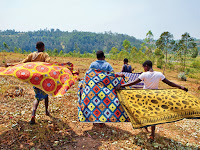I never knew that Africa had such a great history. Their trade routes and their resources that made the routes so successful. Europe practically thrived because of the resources it received from Africa. Gold, Salt, Iron, crops, etc., were some of the most traded item. I never knew that salt was so important to the success of the Africans and I didn't know that they didn't have it. Their farming techniques and the way that women were involved with not only the child rearing and housework, but the farming too really surprised me. Everywhere else women were seen as really a nuisance, they didn't have a purpose but to have kids and make sandwiches. In Africa they were in the main work and labor, they were in the fields and the work areas growing the food while the men were digging out the resources. Women played just as big of a part in Africa's history as the men. It's really empowering for women to hear about and see that there are other reasons for a women other than childbearing. The women of Africa had power and purpose.

The African environment and climate made for hardships already but the people who live their have found a way to really thrive off of the land. They have mapped out their dry and rainy seasons and know the crops to plant to really make the most of what they have. Tropical and wet climate vary throughout the continent and it affects their water supply and food productivity. The Intertropical convergence zone makes farming a very coordinated and planned out activity so they get the most out of their crops. With the habitats ranging from rainforest to deserts they really have a wide variety of resources that they have learned to use for the good. The many connecting rivers that they have make for rich soil and trading routes. With exports of metallic ores and petroleum Africa is a very important place for resources and trade.

One thing that surprised me were all the different cultures and languages that Africa embeds. There are so many unique cultures and languages all living in one area and they have learned to really live together. African culture is expressed in its arts and crafts, folklore and religion, clothing, cuisine, music and languages. The continent of Africa speaks hundreds of languages. There are many ethnic groups and tribes in Africa with their own distinct culture, norms and customs. Some of the major tribes in Africa would include Pygmies, Samburu, Senufo, Tuareg, Wolof, Yoruba, Zulu, Bemba, Afar, Anlo Ewe, Ashanti, Berber, Bambara, Amhara, Bemba, Bobo, Chewa, Dogon, Fang, Eulani, Ibos, Kikiyu, Maasai, Mandinka and Fon. Its amazing to me that all of these cultures live together in one place and interact with one another and that I had never heard of any of them before this class. It really shows how important traditions, customs and stories are to people. Language is something that is taken for granted, but we use it to do everything and language really flourishes in Africa.

Africa had such an important history. I never knew that they were enslaved by Europe and how this affected them. Europeans came in and colonized them and made them take to European ways of life and this really did have a negative affect. They were stripped of their cultures, traditions and way of life. Many believe that this hurt Africa up until today because when other countries were just beginning Africa was thriving. With it being rich in resources and techniques of farming many wondered how Africa got to be the way it is today. Colonization took their own farming and products away from them, it left them with the orders of another continent and other people who really didn't know how important Africa's resources and ways of life were to the people who lived there. I never knew that Africa played such a big part in the World Wars. Fighting for Europe and suffering in the fields because of it. So many lives were lost when they fought for someone else. The World Wars changed Africa forever. They were hit hard by depressions and they had to fight very hard for their own independence. When they received independence many didn't know how to do their own farming and productions anymore. They had forgotten their way of life.

I had no idea about any of this until this class. I really learned a lot about Africa and it is not only a place in the world anymore. I really learned about the importance of Africa and its impact on the world and the world's impact on it. Africa is a place that is rich with resources and gets a lot of negative light thrown its way. With outbreaks of HIV and AIDS people think that this is all there is to Africa. Efforts are being made and they are making progress to help the people with this disease. I recently learned about the technology growth of Africa. Cell phones are becoming very popular. Africa is growing. But this also means so is their poverty, unclean water, and lack of everyday essentials like sewage. I believe that Africa needs to invest in technology and we need to help them with it. Aid is not helping them, but learning how to fish instead of catching all of the fish for them is really going to benefit them. Africa has the potential to leap over all of the advancements of the western hemisphere today. Africa is not dead, it is just beginning.
















